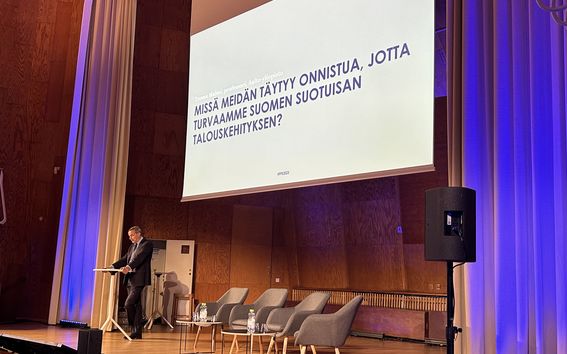The ninth Economic Defence Course analysed the Government Programme

The Economic Defence Course organised by Aalto EE and Helsingin Sanomat newspaper brings together leading experts from the academic world, economic influencers and politicians. The course was held for the ninth time on Wednesday 4 October. The School of Business was represented by Professor of Accounting Teemu Malmi, Academic Director of Helsinki GSE and Professor of Economics Otto Toivanen, and Professor of Ownership Samuli Knüpfer.
The goal of the Economic Defence Course has always been to foster a greater understanding of the economy and the principles of business operations among politicians, because their decisions have a significant impact on the operating conditions of Finnish companies and the national economy.
Companies play a key role in building well-being
In his opening address, Professor Teemu Malmi asked what we have to do in order to secure favourable economic development in Finland. Rather than being an intrinsic value, he stated that the economy is an instrument – and a very important instrument – in terms of building our well-being.
‘A healthy national economy and thriving business make it possible to invest in social welfare, education, culture and national defence,’ explained Malmi.
According to Malmi, there is fairly broad consensus regarding Finland’s role as a small open economy that is dependent on global economic development and where wealth is largely based on the competitiveness of Finnish exports and services in the international market. Companies operating in Finland have difficulty competing with cheap labour, so competitiveness must come from innovations in order to maintain our current standard of living.
‘The top research performed at our universities only becomes innovations and economic well-being when companies transform their inventions into products and services that they can sell internationally. Economists mainly agree on the role that companies play in turning inventions into commercial activities and the significance of innovation activities for the Finnish economy,’ said Malmi.
According to Teemu Malmi, the objectives and measures to improve the operating conditions of companies that are outlined in the Government Programme must be successful, because there will be no welfare society without innovations and thriving business activities.
Malmi highlighted the funding received by Finnish start-up companies, which totalled nearly EUR 1.8 billion in 2022, as a positive development. The importance of these innovative start-ups for the Finnish economy as a whole is still relatively small, but everything possible should be done to provide them with favourable operating conditions. There is a particular need to find solutions to ensure the availability of skilled employees and prevent a labour shortage from slowing the growth of companies and the Finnish economy.
Investments in education promote innovation-driven economic growth
Professor Otto Toivanen analysed the role of the state in creating innovation-driven economic growth. Growth in well-being comes from increased productivity, which is in turn spurred by the invention of new things and/or operating methods and their extensive implementation. Without skilled people capable of innovation, there will be no innovations – and no increase in well-being.
According to Toivanen, the government should focus on areas that promote innovation and where it has a key relative advantage. These include investments in education, creating the right operating environment, promoting the ‘natural accumulation’ of competent people, and collecting and sharing data.
The government should also support activities that have a high rate of social return in relation to private return. Toivanen highlighted a few examples of government measures that promote or slow market activities and innovations, but do not require direct state funding. He believes that a strong competition authority would be particularly important in a country like Finland because, for example, the health service company mergers that took place in the 2000s resulted in a 20% increase in service prices without having a favourable impact on their quality. A second example involved patents for which the ownership rights were transferred from university employees to universities years ago in many countries – including Finland. This change reduced personal incentives and caused a clear drop in the number of patents, thus undermining opportunities for new innovations.
Finland needs ideas, a bold approach and money
Professor Samuli Knüpfer had the task of assessing the measures to promote business growth proposed by four Members of Parliament: Miko Bergbom from the Finns Party, Elisa Gebhard from the Social Democratic Party, Minja Koskela from the Left Alliance, and Ville Väyrynen from the National Coalition Party.
According to Knüpfer, Finland needs ideas, a bold approach and money. In terms of the methods suggested by the MPs, he supported investments aimed at attracting and retaining foreign workers in Finland. Knüpfer was also in favour of proposals that would make it easier for companies to hire new employees.
The Economic Defence Course was organised jointly by Helsingin Sanomat and Aalto University Executive Education (Aalto EE), which provides coaching and development services for business leaders and managers. The partnering organisations were The Finnish Business School Graduates, Academic Engineers and Architects in Finland TEK, and Elo Mutual Pension Insurance Company.
Economic Defence Course website (in Finnish): https://taloudenpuolustuskurssi.fi/
Read more news

Join the Unite! Virtual Education Summit- Registration now open
Join us in shaping international collaboration! This online event takes place 12 March, 2026.
Apply Now: Unite! Visiting Professorships at TU Graz
TU Graz, Austria, invites experienced postdoctoral researchers to apply for two fully funded visiting professorships. The deadline for expressions of interest is 20 February 2026, and the positions will begin on 1 October 2026.Soil Laboratory Exhibition – Exploring the Dialogue Between Human and the Earth in Utsjoki
Soil Laboratory explores the relationship between humans and the earth as a living landscape through ceramic practices in Utsjoki.






